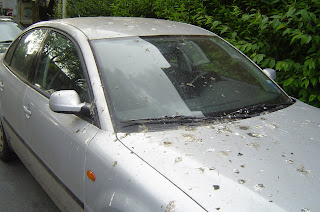


I came home to the desert by the sea only to find how harsh that can be. The sun makes things grow but plays hard ball with the man-made world. Just three meters from my back door the earth forms an abrupt slope, not exactly a cliff, but steep enough you would rather not have to pull weeds there. So, after a year of sun-filled independence, the slope was covered by ubiquitous baby pepper trees and a few other unwelcome green visitors. The ultimate goal here would be to cover the slope with drought-resistant ice plant or red apple, both of which have colorful blossoms at least once a year, but these hardy succulent ground covers don't always take off in the direction you might wish. So men had to be hired to chop, rip-up and transplant. On the day of the transformation, I came home to just one young man, left behind by the boss, a young man who wanted to know if I could please speak Spanish with him. So between my hand and body language and broken Spanish I found out he wanted to know if I wanted the bamboo trimmed and indicated he didn't need a ladder since he had a long-handled, expandable pruning tool which would do the trick. The sun had baked and actually over-cooked the patio furniture protective cover it seemed I had just bought just yesterday. It definitely went directly into the trash. The wooden table and chairs were burnished and warped. The black soaker-hoses were fully useless, having become brittle due to the elements. One soaker-hose had become lodged permanently under a morass of over-achieving ice plant. I pulled and pulled only to tear off a bit of a disintegrating hose. The rest will compost under organic matter. Once the slope had been freed of the vast jungle of undesirables, the "Naked Ladies" appeared. These surprising and delightful little bulbs activate quick-growing stalks which become lovely pink ladies. I cannot keep track of when they routinely bloom because it is not clear what triggers their ascent. You might think bulbs have a fixed time to bloom. In some climates it is a simple matter to know that "lilies of the valley" for example bloom in May and tulips and daffodils are to be expected around Easter time. But these naked ladies dance to their own drummer. They are a welcome sight now adding color to a somewhat bleak slope-scape. Only the bright deep pink bouganvilla high on the slope competes with them for your attention. The hibiscus in the front planter forms a symbolic connection for the inhabitant of this Casita Way house. She also beautified the balcony on Piusallee in Nordrheinwestfalen, wintered in the living room, and then was reborn in yellow on the balcony as summer approached. She did serious battle in the fall of 2007 with an army of small black pests which covered every leaf and every petal. After futile attempts to discourage the little buggers with soap and detergent, every bit of green had to be cut off before the journey into the shelter of the living room for the winter. Warmer and longer days brought out a few healthy blossoms in April. But a premature move outdoors did her in. She had to be replaced with a new yellow plant purchased at the outdoor market on the cathedral square. Fortunately Mary was there and having woven her magic, the new hibiscus flourished. There was no thought of smuggling her back to the States and she remained a pleasant memory until Costco had hibiscus plants on sale. The new plant came home in a pot and sat in the center of the backyard to welcome the grillfest guests but subsequently she desired a permanent plot so she joined the roses in the front planter. She is vivid pink and she greets me everyday upon my return home. She drinks from a new soaker-hose occasionally.









































